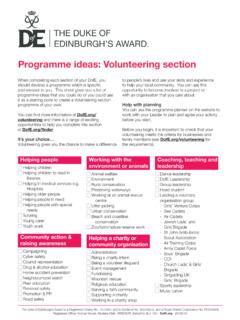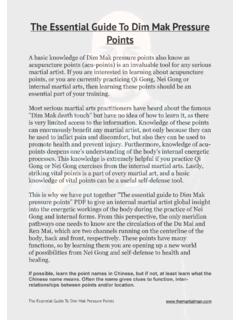Transcription of THE TRAGEDY OF HAMLET, PRINCE OF DENMARK
1 1 THE TRAGEDY OF HAMLET, PRINCE OF DENMARK by William Shakespeare lightly abridged by Peter Gould for the Governor s Institute on the Arts 2007 ..and for the SHAKESPEARE FREE LIBRARY 2 THE TRAGEDY OF HAMLET, PRINCE OF DENMARK by William Shakespeare DRAMATIS PERSONAE Claudius, King of DENMARK . Marcellus, Officer. Hamlet, son to the former, and nephew to the present king. Polonius, Lord Chamberlain. Horatio, friend to Hamlet. Laertes, son to Polonius. Rosencrantz, courtier. Guildenstern, courtier. Osric, courtier. A Gentleman, courtier. A Priest. Marcellus, officer. Bernardo, officer. Francisco, a soldier Players. Two Clowns, gravediggers. English Ambassadors. Gertrude, Queen of DENMARK , mother to Hamlet. Ophelia, daughter to Polonius. Ghost of Hamlet's Father. Lords, ladies, Officers, Soldiers, Sailors, Messengers, Attendants. ACT I. Scene I. Elsinore. A platform before the Castle. Enter two Sentinels-Francisco, [who paces up and down at his post; then] Bernardo, Ber.
2 Who s Fran. Nay, answer me. Stand and unfold yourself. Ber. Long live the King! Fran. Bernardo? Ber. He. Fran. You come most carefully upon your hour. Ber. 'Tis now struck twelve. Get thee to bed, Francisco. Fran. For this relief much thanks. 'Tis bitter cold, And I am sick at heart. Ber. Have you had quiet guard? Fran. Not a mouse stirring. Ber. Well, good night. If you do meet Horatio and Marcellus, The rivals of my watch, bid them make haste. 3 Enter Horatio and Marcellus. Fran. I think I hear them. Stand, ho! Who is there? Hor. Friends to this ground. Mar. And liegemen to the Dane. Fran. Give you good night. Mar. O, farewell, honest soldier. Who hath reliev'd you? Fran. Bernardo hath my place. Give you good night. Exit. Mar. Holla, Bernardo! Ber. Say- What, is Horatio there ? Hor. A piece of him. Ber. Welcome, Horatio. Welcome, good Marcellus. Mar. What, has this thing appear'd again to-night? Ber. I have seen nothing. Mar.
3 Horatio says 'tis but our fantasy, And will not let belief take hold of him Touching this dreaded sight, twice seen of us. Therefore I have entreated him along, With us to watch the minutes of this night, That, if again this apparition come, He may approve our eyes and speak to it. Hor. Tush, tush, 'twill not appear. Ber. Sit down awhile, And let us once again assail your ears, That are so fortified against our story, What we two nights have seen. Hor. Well, sit we down, And let us hear Bernardo speak of this. Ber. Last night of all, When yond same star that's westward from the pole Had made his course t' illume that part of heaven Where now it burns, Marcellus and myself, The bell then beating one- Enter Ghost. Mar. Peace! break thee off! Look where it comes again! Ber. In the same figure, like the King that's dead. Mar. Thou art a scholar; speak to it, Horatio. Ber. Looks it not like the King? Mark it, Horatio. Hor. Most like. It harrows me with fear and wonder.
4 Ber. It would be spoke to. Mar. Question it, Horatio. Hor. What art thou that usurp'st this time of night Together with that fair and warlike form In which the majesty of buried DENMARK Did sometimes march? By heaven I charge thee speak! 4 Mar. It is offended. Ber. See, it stalks away! Hor. Stay! Speak, speak! I charge thee speak! Exit Ghost. Mar. 'Tis gone and will not answer. Ber. How now, Horatio? You tremble and look pale. Is not this something more than fantasy? What think you on't? Hor. Before my God, I might not this believe Without the sensible and true avouch Of mine own eyes. Mar. Is it not like the King? Hor. As thou art to thyself. Such was the very armour he used to wear-- 'Tis strange. Mar. Thus twice before, and jump at this dead hour, With martial stalk hath he gone by our watch. Hor. In what particular thought to work I know not; But, in the gross and scope of my opinion, This bodes some strange eruption to our state. Ber.
5 I think it be no other but e'en so. That this portentous figure so like the King That was, comes armed through our watch. Hor. A mote it is to trouble the mind's eye. They say that ere the mightiest Caesar fell, The graves stood tenantless, and the sheeted dead Did squeak and gibber in the Roman streets; As stars with trains of fire, and dews of blood, Disasters in the sun; and the moist star Upon whose influence Neptune's empire stands Was sick almost to doomsday with eclipse. And even the like precurse of fierce events---Enter Ghost again. But soft! behold! Lo, where it comes again! I'll cross it, though it blast Stay illusion! Spreads his arms. If thou hast any sound, or use of voice, Speak to me. If there be any good thing to be done, That may to thee do ease, and, race to me, Speak to me. If thou art privy to thy country's fate, Which happily foreknowing may avoid, O, speak! Stop it, Marcellus! Mar. Shall I strike at it with my partisan?
6 Hor. Do, if it will not stand. Ber. 'Tis here! Hor. 'Tis here! Mar. 'Tis gone! Exit Ghost. 5 We do it wrong, being so majestical, To offer it the show of violence; For it is as the air, invulnerable, And our vain blows malicious mockery. Ber. It was about to speak, when the cock crew. Hor. And then it started, like a guilty thing Upon a fearful summons. I have heard The cock, that is the trumpet to the morn, Doth with his lofty and shrill-sounding throat Awake the god of day; and at his warning, Whether in sea or fire, in earth or air, Th' extravagant and erring spirit hies To his confine; and of the truth herein This present object made probation. Mar. It faded on the crowing of the cock. Hor. Aye, look, the morn, in russet mantle clad, Walks o'er the dew of yon high eastward hill. Break we our watch up; and by my advice Let us impart what we have seen to-night Unto young Hamlet; for, upon my life, This spirit, dumb to us, will speak to him.
7 Do you consent we shall acquaint him with it, As needful in our loves, fitting our duty? Let's do't, I pray; and I this morning know Where we shall find him most conveniently. Exeunt. Scene II. Elsinore. A room of state in the Castle. Flourish. [Enter Claudius, King of DENMARK , Gertrude the Queen, Hamlet, Polonius, Laertes and his sister Ophelia, Lords Attendant. King. Though yet of Hamlet our dear brother's death The memory be green, and that it us befitted To bear our hearts in grief, and our whole kingdom To be contracted in one brow of woe, Yet so far hath discretion fought with nature That we with wisest sorrow think on him Together with remembrance of ourselves. Therefore our sometime sister, now our queen, Th' imperial jointress to this warlike state, Have we, as 'twere with a defeated joy, With an auspicious, and a dropping eye, With mirth in funeral, and with dirge in marriage, In equal scale weighing delight and dole, Taken to wife; nor have we herein barr'd Your better wisdoms, which have freely gone 6 With this affair along.]
8 For all, our thanks. And now, Laertes, what's the news with you? You told us of some suit. What is't, Laertes? You cannot speak of reason to the Dane And lose your voice. What wouldst thou beg, Laertes, That shall not be my offer, not thy asking? The head is not more native to the heart, The hand more instrumental to the mouth, Than is the throne of DENMARK to thy father. What wouldst thou have, Laertes? Laer. My dread lord, Your leave and favour to return to France; From whence though willingly I came to DENMARK To show my duty in your coronation, Yet now I must confess, that duty done, My thoughts and wishes bend again toward France And bow them to your gracious leave and pardon. King. Have you your father's leave? What says Polonius? Pol. He hath, my lord, wrung from me my slow leave By laboursome petition, and at last Upon his will I seal'd my hard consent. I do beseech you give him leave to go. King. Take thy fair hour, Laertes. Time be thine, And thy best graces spend it at thy will!
9 But now, my cousin Hamlet, and my son- Ham. [aside] A little more than kin, and less than kind! King. How is it that the clouds still hang on you? Ham. Not so, my lord. I am too much i' th' sun. Queen. Good Hamlet, cast thy nighted colour off, And let thine eye look like a friend on DENMARK . Do not for ever with thy vailed lids Seek for thy noble father in the dust. Thou know'st 'tis common. All that lives must die, Passing through nature to eternity. Ham. Ay, madam, it is common. Queen. If it be, Why seems it so particular with thee? Ham. Seems, madam, Nay, it is. I know not 'seems.' 'Tis not alone my inky cloak, good mother, Nor customary suits of solemn black, Nor windy suspiration of forc'd breath, No, nor the fruitful river in the eye, Nor the dejected havior of the visage, Together with all forms, moods, shapes of grief, 'That can denote me truly. These indeed seem, For they are actions that a man might play; 7 But I have that within which passeth show- These but the trappings and the suits of woe.
10 King. 'Tis sweet and commendable in your nature, Hamlet, To give these mourning duties to your father; But you must know, your father lost a father; That father lost, lost his, and the survivor bound In filial obligation for some term To do obsequious sorrow. But to persever In obstinate condolement is a course Of impious stubbornness. 'Tis unmanly grief; It shows a will most incorrect to heaven, A fault against the dead, a fault to nature, To reason most absurd, whose common theme Is death of fathers. We pray you throw to earth This unprevailing woe, and think of us As of a father; for let the world take note You are the most immediate to our throne, And with no less nobility of love Than that which dearest father bears his son Do I impart toward you. For your intent In going back to school in Wittenberg, It is most retrograde to our desire; And we beseech you, bend you to remain Here in the cheer and comfort of our eye, Our chiefest courtier, cousin, and our son.





